Scotland’s Independent Story isn’t over: A Review of Yes/No: Inside the Indyref
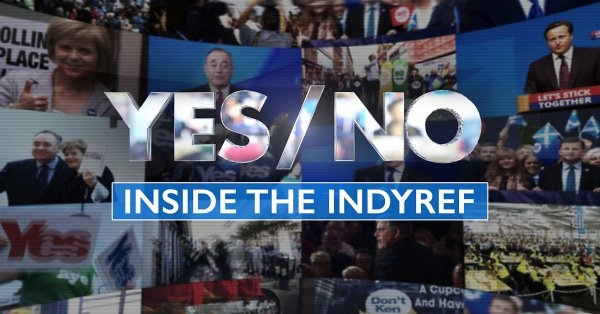

Such a fraught period seems the ideal moment to revisit that other time of near-UK meltdown, namely our indyref – the subject of a three-part documentary on the new BBC Scotland channel, ‘Yes/No: Inside the Indyref’, the last episode of which airs tonight. It is a welcome, long overdue production, coming four and a half years after that historic September 2014 vote, underlying the problems the Beeb has had in Scotland and the UK in coming to terms with such high octane existential politics.
The three programmes covered the political environment in light of the SNP winning a parliamentary majority in 2011 and the agreement of the Scottish and UK Governments on an indyref; from the announcement of the date to the last weeks of the campaign; and the hectic final period of Yes going into the lead and the resulting panic of No and the British political establishment.
There are lots of great stories in the indyref – drama, personalities, controversies, against a longer-term backdrop of Scotland becoming more autonomous, self-confident, and well disposed to the idea of independence. Meanwhile, Britain had deep problems, from loss of Empire and its international standing, to relative economic decline, and harsh structural inequalities and imbalances.
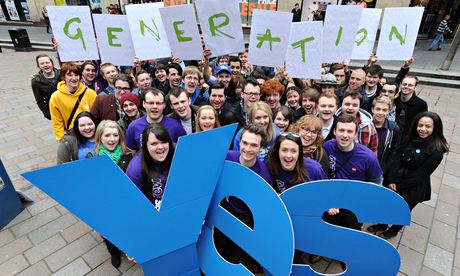

The pace picked up in the second, as the campaign got into gear and Salmond announced on 21 March 2013 the historic day of 18 September 2014. It covered the strategies of Yes Scotland and its ten point scale of getting voters to rate their attitude to independence and Better Together’s segmenting the electorate into 66 different groups. Both had political strategies and intelligence, but only one had a real ground campaign.
This episode touched on the tensions in the respective campaigns: the complete own goal of Better Together self-titling their relentless negativity and rubbishing of independence as ‘Project Fear’: called ‘horrific’ by Michael Moore.
The first programme highlighted that Labour had problems with Better Together, and that Gordon Brown had problems with anyone who wasn’t called Gordon Brown. What was underplayed were the multiple tensions in No, firstly, about Darling’s laconic style of leadership, and secondly, between Scotland and Downing Street (and Cameron, Osborne and their teams who really didn’t understand a country far away in their minds).
Similarly, some of the tensions in Yes Scotland are identified, such as the extent to which it was really SNP controlled and funded. Nicola Sturgeon candidly put it that it took ‘a little bit of time to let go, and some in the Yes campaign will probably say we never quite let go and they may have some justification in saying that.’
Lots of the tensions within Yes, like No, are alluded to rather than explicitly stated such as how the Greens felt they were being used as window-dressing, and the tensions between Yes Scotland and its well-paid staff, and the grass roots, self-organising, DIY Scotland such as Women for Independence, National Collective, and Radical Independence Campaign: the first two cited and having witnesses, while the latter didn’t warrant one mention.
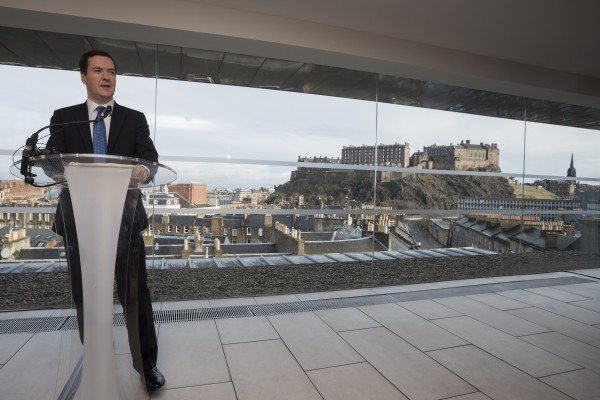

The tensions underlying this come centrestage in the third programme in the Alex Salmond-Nick Robinson stand-off. This was focused on the last days of the indyref with big businesses announcing corporate warnings (aided by Downing Street lobbying), including Edinburgh-based RBS stating that they would consider moving their headquarters to London after an independence vote. Robinson broke this story, asked Salmond about it at an international press conference the next day, with Salmond claiming market sensitive information had been leaked to the BBC, and Robinson charging that Salmond had not answered the question.
This controversy did not end there for it ignited anger in many independence supporters about the shortcomings and biases of the mainstream media, the BBC in particular. Robinson, reflecting with the passing of time, thinks that after their set too, that he over-stated Salmond’s evasions. But critically, this has to be seen in the context of how the BBC in London saw this story, with even Robinson recognising the limits of understanding of senior corporation management.
A thoughtful voice in this is Alan Little, the BBC’s referendum correspondent (and a consultant on the series). He reflected on a discussion in London where he asked colleagues what they thought contributed to the independence debate, with it coming down to two factors: ‘One, the Scots being chippy, and two, Salmond is wily’. He observed that: ‘I was quite surprised by some of my colleagues failing to understand their own assumption that the Yes side was wrong.’
Ken MacQuarrie, then head of BBC Scotland, stuck to the official party line, talking about ‘truth telling’ and ‘fairness’ in the corporation. Missing was any comment from John Boothman, Head of News and Current Affairs at BBC Scotland up until close to the vote, known to be pro-Labour and who had issues in how he did strategy, planning and supported staff.
There is no comment about STV’s coverage beyond that they hosted the first Darling-Salmond TV debate and the BBC the second. Missing is any comment on the press beyond the ‘Daily Record’ and ‘the Vow’: the creation of then ‘Record’ and now independence supporter Murray Foote.
Social media is represented by Stuart Campbell of ‘Wings over Scotland’ fame and Stewart Kirkpatrick, Head of Digital at Yes Scotland. Campbell, says of his abrasive Twitter style: ‘Other peoples’ independence campaigns have waded knee deep in blood. All we did was occasionally call each other some names on Twitter.’ Kirkpatrick reflected that there were two Wings, the fact checker and the uber-partisan tweeter, and that: ‘The cybernat thing definitely hurt us. Unequivocally people being abusive online did not help the Yes campaign.’
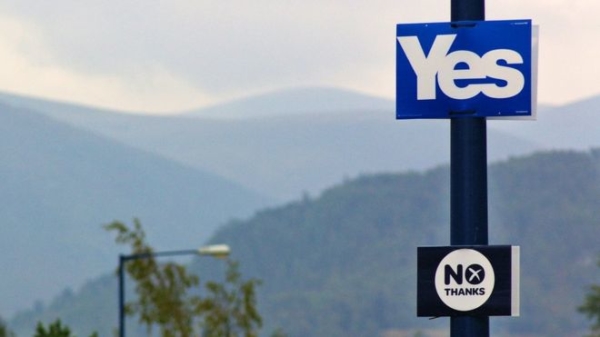

There was at the time rumours of a private poll showing a sizeable Yes lead, but it was thought to be a Yes related survey, not from the other side. This Yes surge occurred eleven days before polling, and while lots of the underlying data was moving towards Yes, with independence appearing to be winning the campaign, seen as the most trusted, and ahead in all age groups under 60 years, there was concern then in the Yes camp that they had peaked too early. The No campaign had time to regroup, launch several high level initiatives including the three UK party leaders heading north, and come up with ‘the Vow’ which broke the cycle of never-ending negativity that No had created for itself. Related to this, Douglas Alexander had earlier come up with the phrase ‘No Thanks’ about how to say with respect no to independence, inspired by the pro-Canadian unity campaign in the 1980 Quebec referendum.
The story so far concludes with the 55:45 victory for No on an astonishing 84.6% turnout. But campaigns are about ideas and unintended consequences – and what happens in their aftermath. On the morning after Scotland’s date with destiny, David Cameron stood outside Downing Street and declared that now was the time for England to speak and bring in ‘English votes for English laws’, the supposed answer to the West Lothian Question. This would diminish the voting rights of Scottish MPs, much to the horror and fury of Darling and Nick Clegg, then Deputy PM.
One recurring theme running through the documentary is how the Westminster class and village struggled to understand modern Scotland, the Tories having to seek regular updates from Scottish Tory leader Ruth Davidson. Cameron did not give an interview for this, but Osborne reveals his limited understanding of Scotland and abilities as a political strategist. At one point he compares independence to ‘being about Braveheart’ and stands by Cameron’s post-vote EVEL stance to this day, saying of Scotland after the 2014 vote that ‘The SNP were put firmly back in their box’ which is delusional.
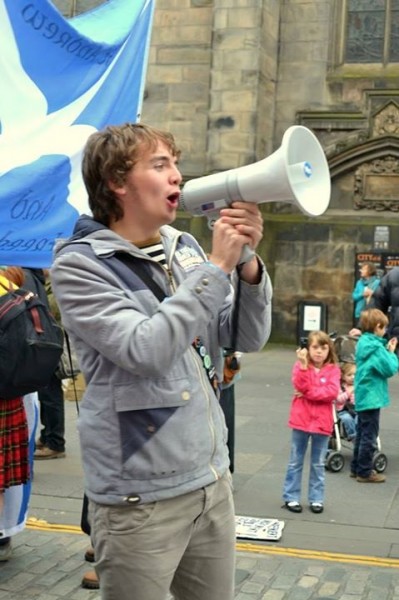

This documentary is one contribution to an ongoing political debate. It was revealing that many pro-union supporters voiced their disdain for this series from the outset, for example, asking, ‘am I alone in simply not having the stomach for this’ (Kevin Hague), ‘It is already ancient history told by ancient irrelevant voices’ (Edwin Moore), and ‘I’d rather stick pins in my eyes that watch it’ (Kate Potts).
Such sentiment seems reflective of the widespread pro-union unease during the indyref that has continued since. Pro-union sentiment contributed to Scotland making history in what was a completely peaceful revolution, but to many on the No side was something painful to get through and then never look back. This could be seen as the mirror image of the uber-independence supporters who cannot stop talking about the summer of 2014 and seem to find it hard to stop revisiting the recent past.
What is incontrovertible is that this slice of contemporary history is not the final take on a story we are still creating and arguing over, and that the destination and conclusion of Scotland’s independence debate will continue to be the subject of many more studies and TV programmes. And will ‘Yes/No’ aid the BBC and other broadcasters in getting it right next time and will it ever be shown on the main UK channels, or is too late and too far into the endgame of Britain?

I think the Unionist reaction on Twitter to this programme, which Gerry refers to, is fascinating.
Instead of expressing even a mild curiosity about a documentary on a huge, democratic event in which they participated, a national discussion about the future of a country they profess to care so much about (a debate they even WON, albeit just) they instead cover their eyes. That this important curation of Scotland’s recent history, in which their own side is fairly represented, fills them with horror is indicative of their very attitude to Scotland: the more Scots are able to create distinct narratives about ourselves the more ‘Scottish’, and less British, we might become. Let’s face it, this is the real Unionist fear. Distinctly Scottish phenomena, like, hmm, a say on our future, our own language, our separate political culture, or broadcasting which tells Scottish stories such as this one, can make us too ‘conscious’ of ourselves, which is why they’d rather ‘stick pins in their eyes’ than look at them.
A Scotland which isn’t simply and obediently ‘British’ feels threatening to them, and yet the reality of Britain is there in every moment of this documentary: Alan Little professing that his BBC colleagues in London couldn’t examine their presumption that a Yes vote was ‘foolish’, or even understand the motivation for it beyond ‘chippiness’ (I mean, the fact that they even used that word so casually in front of a Scot!). George Osborne – the second most powerful member of the government which rules over (and over-rules) Scotland – admits he doesn’t know much about the place beyond ‘Braveheart’ cliches. English Tories have to defer to Ruth Davidson for their comprehension of anything north of the border…
It’s staring Unionists in the face: they go on about our valued place in the ‘nation’ of Britain then admit they have to explain what Scotland even is to the rest of that ‘nation’. Don’t they see how this reveals the lopsided reality of the UK? Or are they well aware of it, but just don’t care, because as long as they, and Scotland, are ‘British’, nothing else really matters?
Unionists boast about being ‘proud Scots’, and maybe they are, but the only Scotland they are ‘proud’ of is one that sits down, shut its mouth and obeys the British ruling elite / the UK Labour party (delete as applicable). Any version of Scotland which doesn’t fit this mould – especially one that might want to assert its democratic rights – is a threat to them. It was there in their entire attitude to the referendum: what’s the maximum we can frighten Scots with and the minimum we can bribe them with, so as to lock them in and keep them powerless to do anything about it forever after?
That they’re so miserable about reliving their own victory tells you everything you need to know.
Yes, well, exactly Alan
It used to be possible to be a proud Scot and a unionist, back in the Victorian era when independence was never an option. The unquestioned fact of the British state meant you could be as proudly Scottish as you liked, then. But the UK is now too fragile to admit to any diversity of identity. So sad that unionists today feel that expressions of Scottishness are a threat to their true identity. How horrible it must be to hate a part of yourself.
Craig P: it was more or less like that into the 1950s, then, gradually, things began to change, and I believe that was as a result of the real decline of the UK. Well before Thatcher, but particularly after her regime, I think the ruling elite saw that it was downhill all the way – for them – unless they did something. That something was to harness the resources of the three satellite nations and use them to sustain an ever-declining England because that is where they reside. I’m afraid that is the bare, unvarnished truth of it, whatever they say to the contrary, and that is why it all feels so imperial/colonial again. That is, at its most fundamental, exactly what it is. Firstly, neoliberal capitalism allowed elements within society – particularly Tory elements – to enrich themselves at the people’s expense; and they were followed by New Labour, which, although even they could hardly be as snouts in the trough as the Tories, did their best to emulate them. When you have vast gulfs opening up between the haves and the have-nots, all facilitated by deliberately engineered corrupt practices throughout society, you are staring decline in the face, as any period in history will attest. We are at the tail end now of the Western Empire days, and, what we are seeing with the calls for independence – in Scotland, in Catalunya, in Quebec, in New Caledonia, and in many other places across the world, is the domestic version, where former imperial states begin to disintegrate into their component parts. That is why Scottish independence is unavoidable for Unionists, not because we are better and brighter or because it is fate or any such deluded fantasy. It is very simply that our time has come, through circumstances not intended but in pursuit of power and wealth by the few, and we either grasp it with both hands or we will lose it, and the moment will pass. Having said that, I also believe that, if Scotland misses the boat this time, we, too, will fall into decline within the UK – deliberately engineered for us by the post Brexit Tory One Nation State that is to come, if the agenda goes to plan. The next time we raise our heads and think about independence or just about getting out from under, it will not be possible to do so peacefully; we will have thrown that chance away by negligence and lack of smeddum.
Interestingly many of my fellow Yes activists are not choosing to watch this because they worry it would be too painful to remember or depressing. I actually found it cheering in that things I knew to be true about the campaign were.
Despite the admissions – limited and grudging – by some in BBC Scotland, I think the anti-independence stance is still the default position of BBC Scotland News and Current Affairs.
This morning Good Morning Scotland was substantially dominated by the ruling of Speaker Bercow, with interviews of several Tories (none with Labour that I heard) or with metropolitan commentators, such as the woman from the Hansard Society who languidly and boredly dismissed any idea of Scottish independence in a few words.
There was an interview with Mr Stephen Gethins, MP of the SNP. From the start the context was ‘this is a serious matter for GREAT BRITAIN, and so we all have to act together to get a solution: WILL YOU TAKE INDYREF 2 OFF THE TABLE?’ Straight out of the Wullie Rennie/Ruth Davidson script.
So, I have little doubt that BBC Scotland will resume its 2014 script.
“So, I have little doubt that BBC Scotland will resume its 2014 script”.
Far fewer will be listening though.
I’m quite shocked that anyone listens.
I thought it was quite striking that when the Yes activist was on the rickshaw welcoming Labour MPs with the Imperial March from Star Wars, the commentary said that this incident received little coverage in the media- as if this was not the result of calculated decision-making by the BBC and STV. Apart from the odd grass roots Yes representatives, this was the usual top-down, insiders’ view of the Indyref. Little mention was made of the grim fate that befell Murphy and the Labour Party in Scotland in the great reckoning of 2015, nor of the irreparable damage done to the BBC’s reputation for integrity and fairness in the aftermath of the Indyref and compounded by the BBC’s abject failure that helped bring us Brexit. I well remember the assurance that the only way to maintain our place in the EU was to vote No in 2014.
I ‘ve left the Labour Party and I will never vote for them again. BBC Scotland neither speaks to me, nor for me outside of Off the Ball and Get It On and when Indyref 2 comes along, I’ll stick to Channel 4 News.
I began watching the series with very low expectations. After all, what was there to say that we did not know, back to front and upside down ? I was surprized that I enjoyed it as much as I did. Mostly, it allowed participants to explain themselves. This might have led to an orgy of self-indulgence – as can happen. Instead, almost every participant will be able to watch their performance with some pride.
I am not much of a cheer leader for the BBC but this was a first rate programme. Alan Little’s involvement may have been the key. He is vastly superior to so many of the BBC’s ‘superstar’ journalists.
I really thought that this film was excellent, and I hope another can be made which shows the aftermath of the referendum to the present day. By letting people speak for themselves, more than a few put their own necks into the noose, Darling, in particular. He came across as arrogant and totally unfeeling, and, all the time, I got the impression he was acting – which is not really surprising, since he is an advocate at law. Or he used to be, at any rate. I may be wrong, but hasn’t he deserted this wonderful Scotland that he managed, with the rest of the shebang, to ruin and lead into Brexit? That is what the ordinary folk in Scotland need to understand: that these people are a group of intellectually lazy and uniformed, self-seeking, entitled, selfish and self-enriching Unionists who have taken the low road – usually to England and London. They really do not care a toss about the Scottish people they leave behind. It is all about them. If they really believed that the Scottish people should be saved, they would have let them speak for themselves, no interference – but, of course, that would have resulted in a YES vote. It is less that they use Scotland as a springboard to baubledom and non-executive directorships on boards of companies, but the fact that they make a name for themselves up here by destroying all our hopes and aspirations before they leave for the bigger pond down south, where, without that initial Scottish springboard and making a name for themselves as Unionist toadies, they would be nothing of any great import – just another bunch of Scots on the make.
I know it is not PC to say so, but I’ll chance it that the truth is important to Bella Caledonia, but much of what we saw in that three-part film was anti Scottish and border-line racist. Yes, you could put it down to an unwillingness to understand Scotland and the Scots, their heritage, culture, languages, etc., but it feels much more than that. It is definitely present in the rUK NO voting community, as I discovered before and during the indyref campaign (particularly in regard to the SNP), but it is even more prevalent in certain sections of the Scottish electorate. There, it manifests itself as an internalized kind of self-loathing and embarrassment about the way many of us speak, the way our education and socialization, our laws, etc. are perceived to be of a lesser quality than I have never witnessed anywhere else, or, if present, even to the same degree. There is something very masochistic about the Scots that almost invites a sadistic response, and, boy, do we get it. It is rife in all the newspaper comments’ sections, even in The National, which is being overrun by a handful of Unionist trolls who all read from the same script: essentially, it comes down to the fact that we can’t have independence because we are all s***e. I am routinely accused of anti Englishness and racism by those who are themselves anti Scottish and racist. It is a knee jerk reaction to any criticism, particularly of the almost 75% rUK NO vote in 2014 which is the only group that has never had to explain its vote – not once – as if it was some kind of entitlement that crushing independence aspirations is a God-given right allowed the righteous.
No, we are called upon daily day to justify our independence stance, so why should the NO voters, who also led us directly to Brexit – not have to explain why they voted as they did? The truth is that only around 47% of Scottish Unionists voted NO in 2014, and any proper psephological analysis of the two votes needs to understand why so many in the rUK Scottish community voted as they did in such a homogeneous way. It simply cannot have been mere co-incidence; something underlay that vote; and it is something we seem very unwilling to face. This should have been a prelude to understanding how to break through that NO barrier in a second indyref, and, because it was not done, for fear of repercussions which they evidently do not fear from us because we are insulted on a daily basis, we are left now, with Brexit and no way out that we can be sure we will negotiate safely.
Long ago, we should have been looking at the Treaty, and especially after 2016 and the Leave vote, when we were not even allowed a voice. No preparation for getting out this way has been done to my knowledge, but, in the end, it might just be the only route left to us. Another NO vote because that rUK NO vote was given ‘special protection’ is all-too-likely in any second indyref, and it will have been our own fault. I would wish to bring everyone with us willingly, whatever their origins, but, at the end of the day, we have a basic human right to save ourselves from harm – the harm that Brexit, unmitigated, is going to bring to Scotland.
The cybernat issue did not massively hurt the indy movement, most people had made their minds up and those bandying ‘cybernat’ around were more than likely staunch ‘No-ers’.
No one thing can be blamed for lack of success, but the economic factor was far more of a decisive factor than twitter use.
Well, my favourite bit was when Douglas Alexander came up with the brilliant, game-changing plan of the slogan “NO, THANKS” for Better Together.
This was hailed as the brainchild of a genius strategist by two or three commentators on the second episode, which just shows you the dearth of talent there is in in politics these days… the leader of the YES online social media campaign (Stuart Kelly?) described this as a moment when he was “worried” and felt YES was “in trouble”… and, all round, Douglas Alexander was praised to the skies for this piece of nifty campaigning…
…the punchline is that, in fact, Douglas Alexander didn’t even think of the slogan “No, Thanks” himself. He nicked it from the Canadian government from their referendum campaign re Quebec, having scoured the internet “all night long”…
… as the American-anglo T.S Eliot put it “bad poets borrow, good poets steal”…
But we know all about the Alexander siblings in Scotland and the giddy high intellectual heights they are capable of reaching….
The most obnoxious interviewee? Gordon Brown by a mile. He makes George Osborne seem like a nice guy, which is an almost impossible task…
The most appealing? Nicola Sturgeon…. and not just for all brilliant hairstyles she’s gone through over the years….
Decent enough production, though very much about the people at the top. It would have been better if they had added on another 3 episodes about the folk at the bottom, ie, the legendary species known as “normal, everyday working people”…
PS: Always refreshing to be reminded, as YES/NO did for me these last few nights, just how completely forgettable most politicians are, unlike football players and managers, pop stars, actors etc….
Michael Moore? I really struggled to place him.
Danny Alexander? Yes, Danny Alexander!!! Who could ever forget him? Well I did. I had totally forgotten of his existence on planet earth. There was just a blank in my mind where a name should have been…. then it all came flooding back (“oh, no, no!” says he, thrashing around in bed in sweaty pajamas).
When they’re in the limelight and become known to you, when they’re IN YOUR FACE, almost always for the wrong reasons, you think that these are people who are going to haunt the mind until your dying day… but in fact, no. They’re gone a few months and you’ve completely forgotten about them, so much so that you’ve forgotten that you’ve forgotten about them…
Which is good news for all of us. Just think, a few months from now and nobody at all will remember Theresa May… boy. am I dying for that day to come.
Theresa who? I cannay mind her. What was she like?… Tall? Crazy? Pudding bowl haircut? Mad as fck! ….Eh. no, sorry…
We can only hope…
PS: If Mhairi Black started her political career touring Scotland on a bus with Jim Sillars, no wonder she finds Westminster a boring provincial backwater…